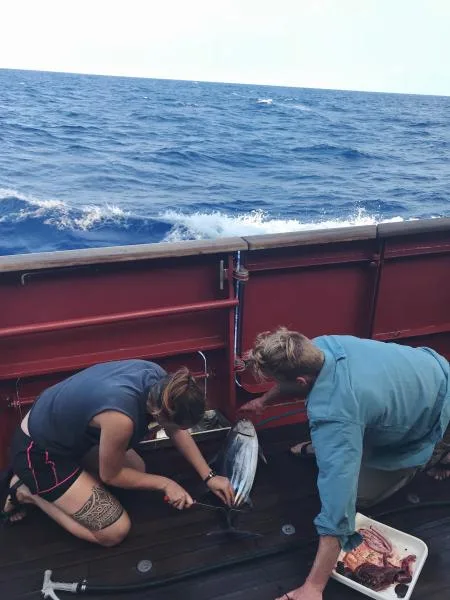Programs Blog
Final Reflections

Ship’s Log
Current Position
Lat 20° 51.42’N Lon 156°41.03’W
Ship’s Heading and Speed
Anchored in Auau Channel near Lahaina, Maui.
Sail Plan
NA
Weather
Sunny with a light breeze
Hello everyone! Welcome to the last student blog from PRX 280. I am Mikaela, originally from Beijing and I go to school in Washington D.C.
After more than ten days of sailing, we reached Hawaii and anchored in the Auau Channel off the town of Lahaina of Maui Island. We started the day with an eventful morning – catching our first fish of the trip, a Skip Jack Tuna spanning 80cm and weighing a whopping 10 kilos, then dissecting its intestines (fun!) and eating the meat for lunch. With exceptional rarity, we discovered in our Neuston Tow several small pieces of ambergris a
much-valued product drawn from sperm whales during the whaling days. A true treasure from the sea! We also experienced the strongest winds of our trip as the ship rolled with the forceful waves and we struggled to move across the slippery deck. In the afternoon, the crew – the mates, the scientists, the engineers, the steward, and the Captain, talked to us about the specifics of their respective responsibilities, and all the pieces that were put together for the successful completion of a single trip from start to end. A swim call followed afterwards, and everyone jumped into the refreshing embrace of the sun-flecked ocean, floating and swimming against a light current.
It is hard to believe that 31 days have already passed since the first day we boarded the Robert C. Seamans in Tahiti; and it is certainly hard to put all my thoughts and feelings into words.
Life on a ship has some adversities, and many of us missed the comfort land provided in the face of a litany of challenges. The lingering risk of sea sickness, the callouses on the hands from hauling, the scorching sun that led to creative tan lines, the sweat that emerged two minutes after a shower, the fatigue of waking up at 1am to stand watch for six hours, the balance practice of rinsing the wet floor when the floor would tilt 30 degrees upwards suddenly, the mysterious bruises and scrapes, and bumping into engine room knobs (or anything hard)… With watch responsibilities, lab processes, academic assignments and chores, each day could seem prolonged and demanding.
Yet most challenges seem to fade with greater rewards. The seemingly dreadful dawn watch is rewarded with the most breath-taking sunrises. The sweat and dirt from Field Day (“clean the ship inside and out”) are rewarded with laughter, fulfillment, refreshing deck showers and a clean ship. The stress of working on our Oceanography research projects is rewarded with finding unique data and gaining knowledge about certain facets of the Pacific Ocean. It is likely that we have all had memorable moments during which we felt so viscerally thrilled by the sheer beauty of the natural world, whether the cerulean blue ocean, the fiery sunsets or the twinkling night sky, that it was hard to complain.
Throughout the voyage, we have been constantly challenged to learn new things. Getting to know how to work the lines and sails, being introduced to nautical terms and practices, picking up clues from the wind and the sea to steer the ship, using a sextant to shoot celestial bodies like the sun, moon, stars and planets to determine a position, identifying species of flamboyant tropical fish and corals in a snorkel survey, conducting
deployments with scientific instruments, cutting vegetables but not any fingers on a rolling boat… these skills could seem ordinary as we got into the mundane routine of the life on the ship, but they are truly special.
As I look back, we’ve become familiar with the boat as we learned with experience what lines to haul on and what sails to set; we’ve crossed the Equator and are no longer pollywogs; we’ve conducted snorkel research in a few of the most pristine and remote Pacific islands; we’ve gotten better at identifying organisms under the microscope on a rolling ship at 3am. We worked together, collected data together for each other, cleaned together, hauled on lines together, created problems together, solved problems together and shared moments together. Throughout the voyage, in addition to learning from the cornucopia of books in the library, I’ve learned something from everyone.
As we are near the end of our journey, part of me is looking forward to life on land, but part of me never wants this voyage to end. I think many of us share this sentiment.
I would like to finish this blog with a quote I discovered in the Fo’c’sle of the ship when I was wiping the bulkheads (nautical term for walls) on the first Field Day:
“Wasn’t that the best of times, that time we were young at sea.” – Joseph Conrad.
– Mikaela Yuchen Wang
To Mom, Dad, and Eirik: I can’t wait to see you soon. ai ni men/ älskar
Recent Posts from the Ships
- Ocean Classroom 2024-A collaborative high school program with Proctor Academy
- Collaborations and Long-term Commitments: SEA’s Caribbean Reef Program Sets a Course for Coastal Programs that Compliment Shipboard Experiences.
- Sea Education Association students prepare for life underway using state of the art nautical simulation from Wartsila Corporation.
- SEA Writer 2022, Magazines From the Summer SEA Quest Students
- Technology@SEA: Upgrades Allow Insight into Ocean Depths
Programs
- Gap Year
- Ocean Exploration
- High School
- Science at SEA
- SEA Expedition
- SEAScape
- Pre-College
- Proctor Ocean Classroom
- Protecting the Phoenix Islands
- SPICE
- Stanford@SEA
- Undergraduate
- Climate and Society
- Climate Change and Coastal Resilience
- Coral Reef Conservation
- Marine Biodiversity and Conservation
- MBL
- Ocean Exploration: Plastics
- Ocean Policy: Marine Protected Areas
- Oceans and Climate
- Pacific Reef Expedition
- The Global Ocean: Hawai'i
- The Global Ocean: New Zealand